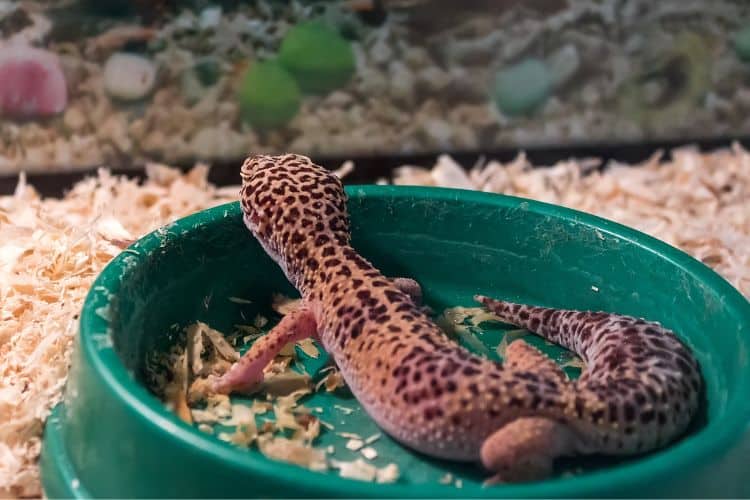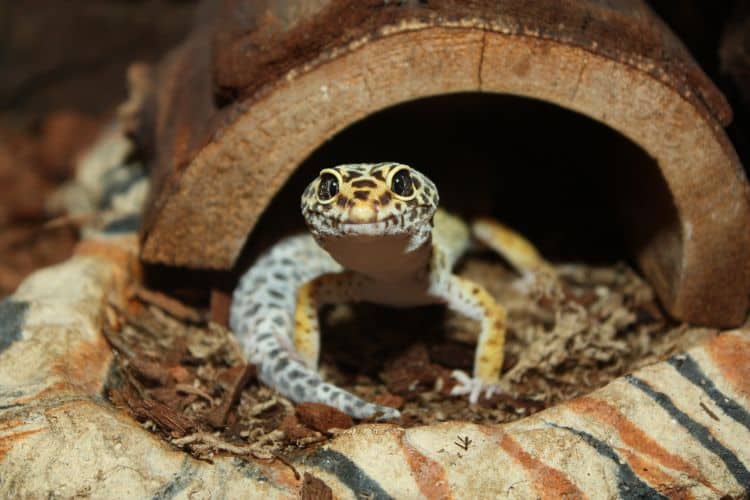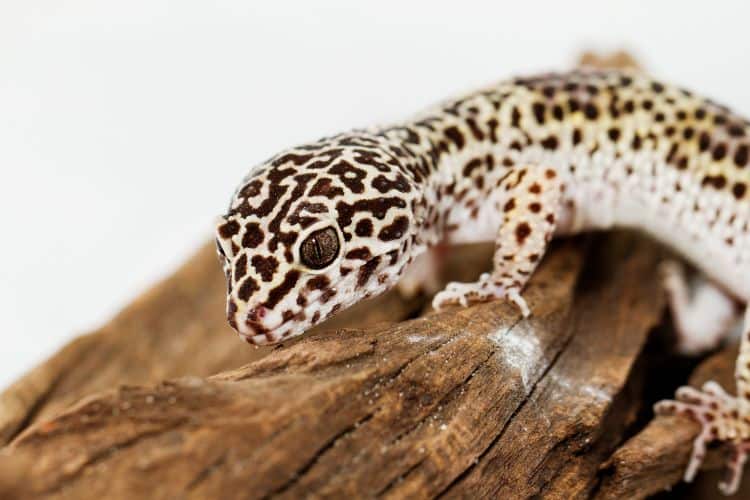Have you ever looked at your pet leopard gecko, their curious eyes fixed on yours, and wondered… Do they actually know me? Can this seemingly simple creature learn my routines, recognize my voice, or even solve problems? The answer might surprise you!
This article delves into the fascinating world of leopard gecko intelligence, exploring their hidden potential for learning, adaptation, and even problem-solving.
Are leopard geckos smart? Let’s find out!
Understanding Intelligence in Reptiles: Instinct vs. Cognition
Instinct—behaviors that animals are born with and don’t need to learn—is important for reptiles. But instinct doesn’t cover all the clever and flexible behaviors we see in reptiles.
Research indicates that reptiles are surprisingly good learners.
For example, lizards can figure out maze puzzles, tell colors apart, and solve basic challenges. Snakes change how they hunt based on what they’ve learned, and turtles can recognize different people.
These discoveries shake up the old idea that reptiles only rely on instincts, showing they’re more flexible and clever than we thought.
The boundary between instinct and intelligence becomes less clear when we explore how reptiles learn from each other through social learning.
Take the leopard lizard, a charismatic desert dweller known for its striking markings and surprising smarts. While leopard lizards naturally perform behaviors like burrowing and sunbathing, their capacity to learn from peers enhances their cognitive skills.

Some of the most notable indications of reptile intelligence include:
- Problem-solving skills, such as navigating complex environments or finding food in novel situations
- Memory retention, demonstrated by remembering locations of food sources or successful hunting strategies
- Communication abilities, including visual displays, body language, and vocalizations for social interactions
- Cooperative behaviors, such as group hunting or parental care, indicating social intelligence
- Adaptability to changing environments, shown through habitat selection and response to environmental cues
Leopard geckos exhibit several of these intelligent behaviors, indicating that they possess some level of smarts worth investigating.
Are Leopard Geckos Smart? Cracking the Code with Their Behavior and Abilities
Beneath a Leo’s cuteness lies a mind more complex than many realize. Here are some of a leopard gecko’s remarkable behavior and abilities:
Learning and Adaptability
Unlike purely instinct-driven reptiles, leopard geckos display a surprising ability to learn and adapt. Studies reveal they can:
- Navigate Mazes: Their spatial awareness and problem-solving skills shine as they find their way through intricate paths to reach rewards.
- Discriminate Colors: They’re not just drawn to heat signatures; they can distinguish between colors, potentially aiding in prey identification.
- Remember Food Locations: They possess impressive spatial memory, recalling the location of hidden treats long after they’ve been stashed away.
These feats go beyond pre-programmed behaviors, suggesting a cognitive ability to process information, learn from experience, and adjust their actions accordingly.
Imagine a leopard gecko initially hesitant towards a new feeder insect, overcoming its apprehension and learning to enjoy the novel food.
This adaptability speaks volumes about their learning capacity!
Recognizing Individuals and Communicating
While not boasting complex social structures like some reptiles, leopard geckos exhibit intriguing social behaviors. They:
- Communicate Through Vocalizations: Tail wags and chirps convey information, suggesting a basic understanding of communication within their reptilian society.
- Recognize Familiar Humans: Studies suggest they can distinguish between their human caregivers and strangers through scent, potentially forming bonds and learning to associate certain individuals with positive experiences. Geckos also display self-recognition, an ability that indicates awareness.

Problem-Solving
While their problem-solving abilities may not rival those of more complex vertebrates, leopard geckos have demonstrated the capacity to overcome obstacles in their environment. For example:
- Escaping Enclosures: Their resourcefulness shines when they manage to find innovative ways to escape seemingly secure enclosures, demonstrating an understanding of spatial constraints and the ability to manipulate objects.
- Adjusting Hunting Tactics: If their initial hunting attempt fails, they’ll adapt their approach, trying different strategies until they find success. This trial-and-error learning suggests a level of flexibility and problem-solving that go beyond pure instinct.
- Find Food: Leopard geckos exhibit exploratory behavior when foraging for food, systematically searching their environment for potential prey items. They may investigate crevices, burrows, or other hiding spots where insects are likely to shelter.
These examples showcase their ability to think critically, adjust their behavior based on experience, and find solutions to challenges they encounter.
Memory Retention
Leopard geckos show evidence of memory retention, particularly concerning food sources and spatial awareness. They may remember the location of hiding spots or the timing of feeding schedules, indicating a capacity for learning and memory formation.
How Smart Are Leopard Geckos?
The question of how smart any animal is complex, and applying human standards of intelligence to reptiles like leopard geckos can be tricky.
However, we can still gain valuable insights into their cognitive capabilities by comparing their behavior and abilities to other reptiles.
- Corvids (Crows, Ravens): Often considered the smartest reptiles due to their tool use, communication skills, and problem-solving abilities. Leopard geckos likely fall below them in terms of complexity but share some cognitive strengths.
- Monitors (Komodo Dragons, Tegus): Known for complex social structures, hunting strategies, and learning abilities. While leopard geckos lack their social complexity, their individual learning and problem-solving skills are comparable.
- Snakes: Exhibit various levels of intelligence based on species. Some, like vipers, rely heavily on instinct, while others, like cobras, demonstrate impressive learning and problem-solving. Leopard geckos likely surpass simpler snakes in cognitive ability.
- Lizards: Diverse group with varying intelligence levels. Some, like iguanas, show complex social behaviors and learning abilities, while others rely more on instinct. Leopard geckos arguably exhibit higher cognitive skills than most gecko species.
Leopard geckos might not be the smartest reptile in every aspect, but their impressive learning, adaptability, and problem-solving skills place them among the more cognitively advanced reptiles.
They’re smarter than many other lizard species, such as anoles or skinks, but they might not match the intelligence level of some larger reptiles like monitor lizards or certain snake species known for their complex behaviors.

Can Leopard Geckos Learn Tricks?
Surprisingly, yes, leopard geckos can learn simple tricks!
While they might not be mastering complex routines like dogs, they possess a surprising ability to understand and respond to cues, allowing them to learn basic behaviors. These include:
Target Training
This involves teaching your gecko to approach and touch a specific target, often a colored stick or cup, in exchange for a reward like a feeder insect.
Following a Finger
You can gently guide your gecko’s head with your finger to move across surfaces or even follow a specific path.
Responding to cues: Some geckos can learn to associate specific sounds or words with rewards, like coming to their enclosure when called or responding to a gentle tap on the glass.
Crate Training
Some leopard gecko owners have successfully trained their pets to enter a designated hide or enclosure on command. This can be useful for transportation or providing a safe space for the gecko when needed.
Feeding Response
Leopard geckos can learn to associate certain cues, such as the sound of their feeding dish or the opening of their enclosure, with feeding time. Over time, they may learn to approach the designated feeding area when they hear these cues.
Attributes That Work Against Leopard Gecko Intelligence
While leopard geckos demonstrate certain cognitive abilities, some factors may limit or work against their intelligence. These include:
Limited Brain Complexity
Compared to mammals, leopard geckos have relatively simple brain structures, which may constrain their cognitive capabilities.
Unlike mammals, which have evolved complex brains for things like problem-solving and social interaction, leopard geckos’ brains are geared more towards simple tasks like finding food and staying safe.
Instinctual Behaviors
Leopard geckos rely heavily on instinctual behaviors for survival, which may override opportunities for more complex learning or problem-solving.
Limited Social Interaction
Leopard geckos are primarily solitary animals and don’t engage in complex social interactions like some other species, which may limit opportunities for social learning and cognitive development.
Short Attention Span
Leopard geckos have a relatively short attention span and may quickly lose interest or become distracted during training sessions, making it challenging to teach them complex behaviors.
Limited Environmental Stimulation
In captivity, leopard geckos may not have access to the same environmental enrichment opportunities as they would in the wild, which can impact their cognitive development and behavioral flexibility.
Lack of Domestication
Unlike some other pets like dogs or cats, leopard geckos have not been subjected to selective breeding for traits related to intelligence or trainability, which may result in a less predisposed capacity for learning and problem-solving.
Final Thoughts
Leopard Geckos’ knack for learning from experience, finding their way through mazes, and even identifying individuals surprises us and makes us rethink what we know about how smart reptiles can be.
Even though their brains may be different from ours, and they hunt differently, they have their own special mental abilities that we should recognize and admire.

